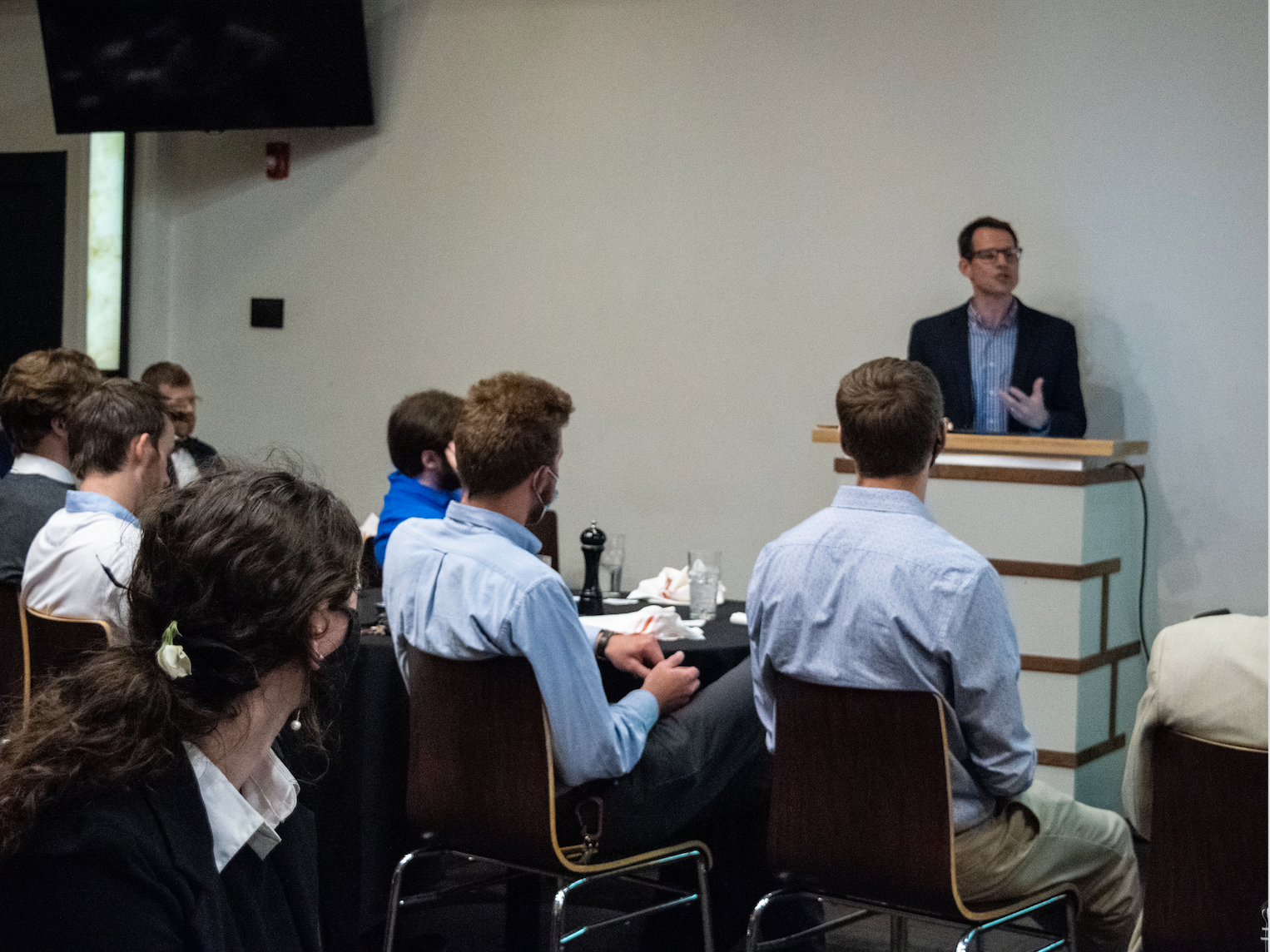![]()
Divisions within the United States, the church and even on Christian college campuses run deep, especially around one term: white Christian nationalism.
The American Enterprise Institute (AEI) annual dinner on April 8 took a deep dive into white Christian nationalism through the research of Samuel Perry, associate professor of sociology at the University of Oklahoma. Perry is also the co-author of “Taking America Back for God” alongside Andrew Whitehead. “It’s maybe a message that is difficult to sit with as a Christian institution but something that we should acknowledge the trends of,” Caitlyn Aversman, AEI co-chair, said.
The event at 28 Springs partnered with the Center for Faith and Flourishing (CFF). Perry’s invitation came about through the work of AEI co-chairs, Aversman and Seth Billingsley, and codirector of CFF, Daniel Bennett.
Perry collected data through the Public Discourse and Ethics survey, covering polls from 2019 to 2021, including responses following the Jan. 6 riot at the U.S. Capitol. In the study, Perry explained how his methodology varied from other researchers. “Unlike opinion polls that classify persons as evangelical or Republican or white on the basis of whether they self-identify with those labels, I identify Christian nationalism and Christian nationalist as a constellation of beliefs,” Perry said.
The basis of these beliefs comes from a “national myth that blurs distinctions between culture and race, explicitly claiming priority for conservative Christian heritage and values but always understanding these values as essentially white,” Perry said. “We can never ignore the whiteness of Christian nationalism because, as I will show here in this talk, when white Americans hear the words ‘Christian’ and ‘American,’ they have historically and still tend to understand them to mean people who look like us, like me.”
Defining ‘white Christian nationalism’
The constellation of beliefs Perry laid out in defining Christian nationalism consists of items on a seven-question survey, including “I consider founding documents, like the Declaration of Independence and the U.S. Constitution, to be divinely inspired,” “The federal government should declare the United States a Christian nation,” and “The federal government should allow prayer in public schools.”
While different Christians may agree with some, but not all, of the statements, all of the items strongly correlate to Christian nationalism, Perry said. “The same people [by which] the founding documents are inspired or that the federal government should declare us a Christian nation are usually the same people who score higher on prayer in public schools or religious symbols in public spaces,” Perry said. “The reason is because the prayer in public schools question and the religious symbols, they tap into cultural war questions.”
When looking at where Christian nationalism is most prevalent in the population, racial distinctions appear in the survey data. The average Christian nationalism score of white evangelicals, on a scale of 0 to 28, was 20.4. For Black conservative Protestants, it was 17.7, 14.8 for white Roman Catholics, 14.1 for Hispanic Roman Catholics, 13.8 for Black liberal Protestants and 13.2 for white liberal Protestants.
Differences between racial groups
Looking at the scores of white evangelicals and Black conservative Protestants appears to go against Perry’s argument. However, he emphasizes the importance of looking at different racial groups’ understandings of discrimination.
In recognizing that none of the seven indicators for Christian nationalism say anything about race or beliefs on race, Perry presented data looking at whether an individual’s Christian nationalism score would predict their racial attitudes. “Whether someone agrees or disagrees with those statements should tell us very little about their racial attitudes, especially after we control for … political ideology … or age or education,” Perry said. “Well, actually on the contrary, they tell us everything if you’re a white American.”
After President Biden took office in February, Perry asked Black and white Americans about how much discrimination they expected to face in the next year. For Black Americans, their perception of future discrimination remained relatively stable at around 3.5 on a 4-point scale, regardless of their score on the Christian nationalism scale. However, for white Americans, the higher they scored on Christian nationalism, up to 28 on a 28-point scale, the higher they also reported potential levels of discrimination for white Americans in the coming year, over 3.5 on a 4-point scale.
These racial differences and higher scores on Christian nationalism also seem to be due to one’s understanding of history. In giving respondents a history quiz with five true/false statements, Perry uncovered “a fairly tight connection between Christian nationalist ideology and belief in straight-up falsehoods … about American’s political history for white Americans, but that connection didn’t seem to exist for Black Americans.”
The quiz included statements like “The U.S. Constitution references our country’s obligation to God several times”, which is false, and “The phrase ‘Under God’ was not added to the Pledge of Allegiance until after 1950”, which is true. “If you score high on Christian nationalism, you didn’t do very good,” Perry said. For Black Americans, their scores on the quiz remained relatively flat no matter their score on the Christian nationalist scale. For white Americans, their history quiz scores decreased as their levels of Christian nationalism increased, Perry said.
In hearing the results of this quiz, Curtis Cunningham, department chair of Teacher Education and Social Studies, was reminded of the trends surrounding civics education for public schools. “Particularly after the insurrection, and even in the months during the election leading up to it, there have been some pretty robust conversations in the education community … we need to spend more time helping [students] understand what a representative democracy is … One of the greatest threats to our democracy is an uninformed and naïve public,” Cunningham said.
Christian nationalism during COVID-19
The impact of Christian nationalism for white Americans is not limited to the educational realm; it also influences their response to the coronavirus pandemic.
Examining levels of trust in experts, such as medical professionals and the CDC, lower levels of trust (often less than 20%) from surveyed white Americans correlated with higher levels of Christian nationalism, earning up to 24 on a 24-point scale. In contrast to trust in experts, white Americans reported higher levels of trust in Donald Trump, over 85%, which also correlated with higher levels of Christian nationalism, yet again earning up to 24 on a 24-point scale.
In terms of responses to the pandemic, Perry found that “white Christian nationalism powerfully predicted resistance to following the recommendations of health experts during the early stages of the pandemic.”
“When we asked Americans in May 2020 how frequently they followed recommended precautions … such as wearing a mask … white Americans who scored high on Christian nationalism were much less likely to take such precautions,” Perry said. “In fact, they were more likely to engage in behavior that experts discouraged, such as meeting with large numbers of people, eating out at restaurants or shopping for non-essentials.”
These results are consistent with what Cunningham has seen in his own life. “I don’t know if they would call themselves [Christian nationalists],” Cunningham said, “but the data that he presented is consistent with what I have heard them say and the behaviors that I have observed personally.”
Trinity McMahan, junior history major, has also witnessed the impact of Christian nationalism at her church in Northwest Arkansas. “There was a strong culture of fear, and people I knew often voiced a need to stand up against perceived political persecution. Every Independence Day, my church would sing patriotic songs, but one in particular always bothered me,” McMahan said. “The chorus went, ‘I’m an American Christian, born in the USA, American Christian, born again by God’s grace, I thank God for my country where I can worship and pray, American Christian, loving my Jesus, in the USA.’ This song, and other songs like it, conflated the American and Christian identities to a point where it seemed to regard these identities of equal importance.”
However, through Perry’s talk and Q&A session, McMahan felt reassured in how to respond to this trend. “When I asked Dr. Perry what he suggested for church congregations that have become swept up in the idolatry of Christian nationalism, he advocated for a return to the gospel,” McMahan said. “This solution is the most simple and powerful that I’ve heard. Only the truth of the gospel can change hearts by replacing the fears driving Christian nationalism with faith in God and love for others.”
Photo: María Aguilar/The Threefold Advocate





